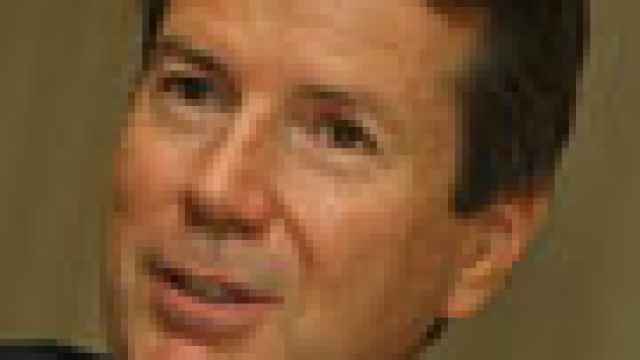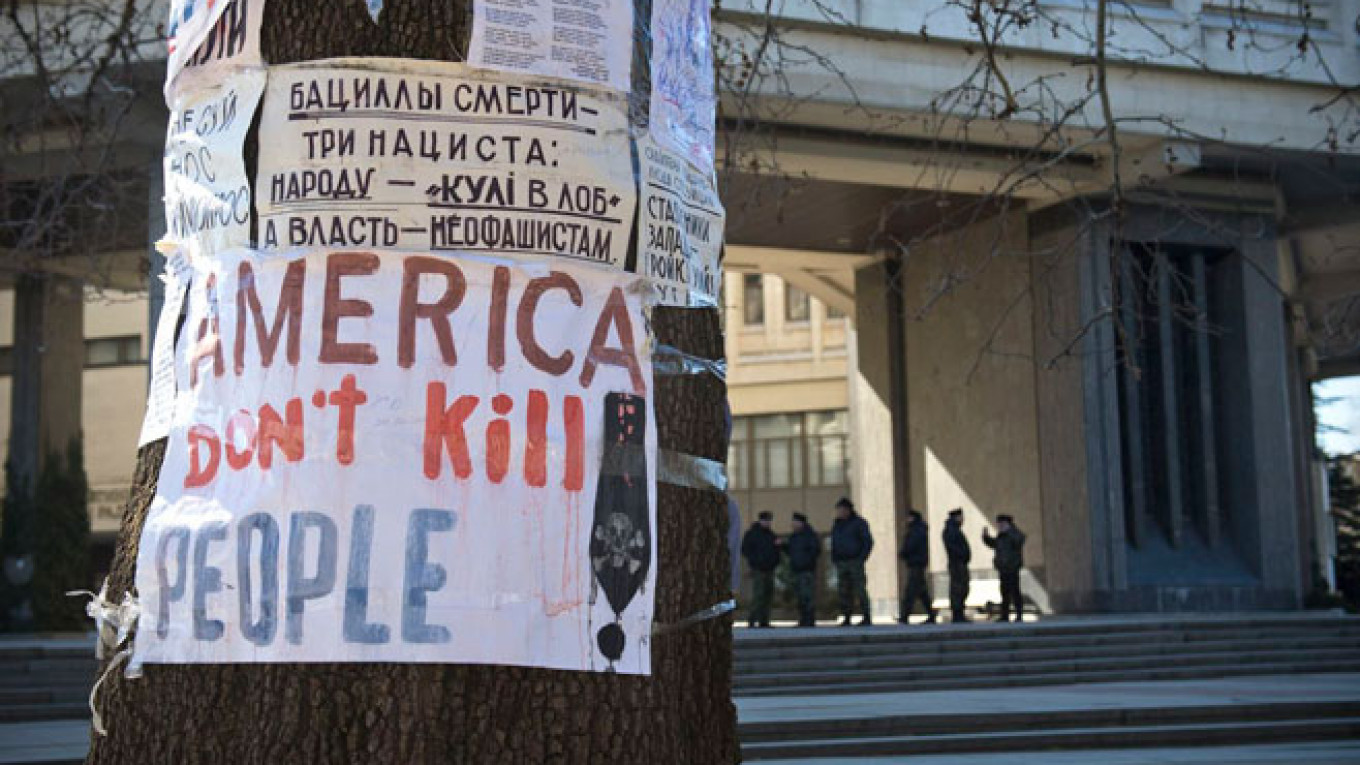
general director, Electronic Arts Russia
“I am a big believer in the potential of Russia and, irrespective of politics, people want to eat, buy household goods, cars and go on vacation. People are already on this path, and they are not going to turn back to a darker age. Businesses are formed and exist to service those needs. If businesses believe in their products’ brands, they should be able to make the right decisions even during this period.”
American and European investors are caught in a major crisis amid a standoff between the Kremlin and Western governments over Ukraine, with local revenues sliding and business confidence suffering a body blow that could take years to heal.
Battle-hardened expatriates who rode out the 1998 economic collapse and other Russian crises over the past two decades are vowing to push ahead with their work, even as some quietly transfer their sizable savings abroad.
But the investors also acknowledge that they are at the mercy of sparring governments, which have shown no sign of budging over the Crimea crisis, and perhaps especially President Vladimir Putin, who has offered scant clarity about his thinking.
"This episode ranks worse than any political confrontations or the GKO crisis in 1998 because it gives fuel to the people who said, 'I told you so,'" said a foreign executive involved in millions of dollars in direct investment in Russia.
The economic impact of the crisis is already being felt, with potential investors delaying trips to Russia and senior foreign executives canceling visits and postponing work on Russian growth strategies.
"I think the crisis — no matter which way it pans out — is already having a negative effect on market growth and foreign investment," said Owen Kemp, an Austrian national and president of Newclouds, a management consulting company, who has been working here since the 1980s.

managing director of Radius Group, a real estate infrastructure solutions company with about $1 billion in warehouse projects in Russia.
Russia's military presence in Crimea combined with its apparent support of the Ukrainian peninsula becoming a part of Russia in a weekend referendum have prompted the U.S. and European Union to warn the Kremlin to stand down or face sanctions. Threatened penalties include visa bans and asset seizures for Russian officials, and could expand to include financial and trade restrictions.
The Kremlin-friendly Federation Council responded to the threatened sanctions by drafting legislation that would allow Russia to confiscate the property of U.S. and European companies. The bill is designed to help "the president and government protect our sovereignty from attack," Senator Andrei Klishas explained last week.
The announcement sent shock waves through a foreign business community already on edge about the Crimea crisis and the sluggish Russian economy. The Moscow Times interviewed about 20 senior company executives by phone, e-mail and in person over the past two days to gauge how the crisis was affecting their businesses.

non-executive board member, Aton; banker and entrepreneur with more than 20 years experience in Russia.
“More than at any point in a quarter of a century, Russia’s growing integration with Europe and the wider world is at risk of some reversal. Whatever the merits of Russia’s policy in Crimea, since March 1 significant uncertainty and even fear have been introduced into the calculation of all who participate in the Russian economy.”
“Russia today is surely in recession. Even without sanctions or further ruble volatility or steeper declines in asset values, 2014 will be, at best, a lost year for the economy.”
“Expect to see reduced overall investment, lower employment at major manufacturers, and weaker consumption than we otherwise would have forecast. The government will, of course, take measures in support, but this will probably have the unhappy side effect of expanding the influence of an inefficient state on an economy that needs less, not more of it.”
The prospect of property confiscations has frightened expatriates who have earned millions of dollars over the years in Russia's once-booming economy.
"I am glad I do not have any assets here," said a senior U.S. lawyer who assists foreign companies in entering Russia. "I used to own my own company, but I gave back my shares a few years ago. I do not own any real estate, no apartment, not even a car."
He and many other foreigners spoke on condition of anonymity, saying they feared reprisals from the Russian government or corporate shareholders.
The lawyer predicted that the Russian economy would ultimately lose regardless of how the crisis played out. "No matter what happens, this crisis is going to leave a bad taste in people's mouths for the next one to five years," he said.
A U.S. expatriate who has worked for private and state financial companies here also expressed relief that he had not acquired any Russian property, choosing instead to invest in multiple homes abroad. But he still maintained considerable savings in Russian bank accounts until this week when, with the Crimea crisis looming large, he transferred his last half a million dollars out of the country.
Top executives said they expected to see their corporate revenues slide for now and more serious challenges if the crisis deepened with Western sanctions.
"We are long-term investors, so we are cautious about short term and optimistic about the long term," said Christopher Van Riet, managing director of Radius Group, a real estate infrastructure solutions company with about $1 billion in warehouse projects in Russia. "If the crisis escalates, which we do not expect, it would impact our long-term optimism."

managing partner, Evans Property Services, a leading real estate brokerage in the upper market segment.
“Since we are in the real estate business, which deals primarily with properties in Moscow, London, New York and other major markets and do not do work in Ukraine, our operations have not been affected. We have clients, however, who lost property in Crimea. They used to own radio stations in Yalta and Simferopol, but their broadcasting was simply turned off and reprogrammed to Russian radio stations without any compensation or notice. We are lucky not to deal with or own anything there.”
Van Riet, a native of the U.S. state of Texas, said that he was carefully monitoring his company's 2014 investment program and would reduce total investment if uncertainty persisted.
Tony Watkins, general director of Electronic Arts Russia, said the video game giant was assessing the impact of the weakening ruble on revenues and profitability but had not modified its strategy.
"We expect some negative impact in the coming year but will aim to navigate through it as in other challenging periods in the past," he said. "We have strong belief in the Russian potential."
That faith might be shared by foreign companies that are pushing ahead with recruitment plans.
"As far as our clients are concerned, we have not seen any slowdown in hiring activity," said Pavel Ishanov, managing partner with the Moscow office of Stanton Chase, a leading global executive search firm. "We have not discussed this [the Crimea crisis]. They are proceeding as they planned."
Ishanov added, however, that inertia might explain the unfettered hiring. "Maybe we will notice something in three or four weeks," he said.
Several investors said it was too late to worry about the short-term fallout and the bigger question lies in Putin's next move.
"To a large extent, you have already taken a hit if you are here," said a U.S. company director who has worked in Russia for more than 20 years. "If Russia takes Crimea and the Group of Eight kicks out Russia, it really will not have any impact on businesses operating in the country."

adviser to the Tatarstan government who has lived in Russia since 2008, and owner of the Budapest, Warsaw, and Prague Business Journals from 1992- 2004.
“Most foreign business leaders think that over time the West and especially the U.S. will become closer and possibly much better allies with Russia because we share three major concerns: an aggressive China, oil and Islamic fundamentalism.”
What will have an impact is the current unpredictability, he said. "We do not know what Putin wants," he said. "The issue you have is a guy who is making all the decisions for Russia and nobody — not Russians or foreigners — knows what he wants."
He advised foreign investors to follow his lead: "Keep you head down and keep working. Maximize your efficiency. This is an opportunity for those who keep their wits about them and do not get emotional."
Incidentally, the government is well aware of investor worries about unpredictability. The head of the federal agency for overseas cooperation said in an interview published Thursday that the government faced a major challenge with foreigners who perceive Russia as "unpredictable and aggressive." It will take the Kremlin years to improve on this image, Rossotrudnichestvo chief Konstantin Kosachyov told Vedomosti.
Some business leaders hope that cooler heads will prevail in Washington and Brussels. Frank Schauff, a German national who heads the Association of European Businesses, a group of more than 600 companies, will press for a diplomatic solution to the Crimea crisis during meetings with senior EU officials in Brussels next week.
"We will stress that businesses have an interest in peace and stability on the European continent," said Schauff, a member of a delegation of AEB business leaders that will visit Brussels on a previously scheduled trip on Tuesday and Wednesday.
While calling the Crimea crisis serious, Schauff downplayed the notion that it dwarfed others in post-Soviet history, saying there were worse moments during the Balkan crises of the 1990s. In the case of Crimea, no war has broken out, he said.

an Austrian national and president of Newclouds, a management consulting company.
“My advice to other investors: Do not make the crisis a self-fulfilling prophecy by ramping down your investments, projects, activities and initiatives in advance of any potential escalation of the crisis. Stay put. Do not make your Russian customers believe you are only a fair-weather partner and that your company is focused on politics and not on customer care. Stay close to your local employees and listen to them and support them in this situation.”
But Peter Necarsulmer, executive chairman and cofounder of PBN Hill+Knowlton Strategies, a leading strategic communications and public relations firm in the former Soviet Union, called the crisis the worst he has seen since the Berlin Wall came down in 1989.
"Russia's annexation of Crimea is a done deal," said Necarsulmer, a U.S. citizen who has worked in Russia for 24 years. "Unfortunately, the West has put itself unnecessarily on a very weak limb. The U.S. especially cannot afford a Syria scenario when it does not follow through on a threat to take serious action.
"But," he said, "it will be short of a full Cold War."
Necarsulmer, whose company's Kiev office closed for a few days amid the recent street protests, urged foreign investors to stick to their commitments in Russia, stay out of politics, and to offer support to their Russian employees.
"Russian employees need to be assured of Western companies' commitment to this market," he said.
All eyes are now trained on Sunday's referendum in Crimea and the West's first response, which is expected as early as Monday from the EU.
A U.S. partner with a major international law firm who advises foreign investors conceded that he was having trouble understanding the crisis and thought the situation was far more complicated than described by the media.? "I am not defending Putin, but I don't think it is fair to call this naked Russian aggression," he said.
Asked if that was the advice he was offering foreign clients, he chuckled dryly and said: "No, these are the water-cooler conversations that I have with people as I try to make heads or tails of this. As lawyers, we have to take the most conservative approach."
His formal advice to investors? "Russia's response will depend on what the West does. It is too early to speculate at this point."
Contact the author at mcchesney@imedia.ru
A Message from The Moscow Times:
Dear readers,
We are facing unprecedented challenges. Russia's Prosecutor General's Office has designated The Moscow Times as an "undesirable" organization, criminalizing our work and putting our staff at risk of prosecution. This follows our earlier unjust labeling as a "foreign agent."
These actions are direct attempts to silence independent journalism in Russia. The authorities claim our work "discredits the decisions of the Russian leadership." We see things differently: we strive to provide accurate, unbiased reporting on Russia.
We, the journalists of The Moscow Times, refuse to be silenced. But to continue our work, we need your help.
Your support, no matter how small, makes a world of difference. If you can, please support us monthly starting from just $2. It's quick to set up, and every contribution makes a significant impact.
By supporting The Moscow Times, you're defending open, independent journalism in the face of repression. Thank you for standing with us.
Remind me later.


